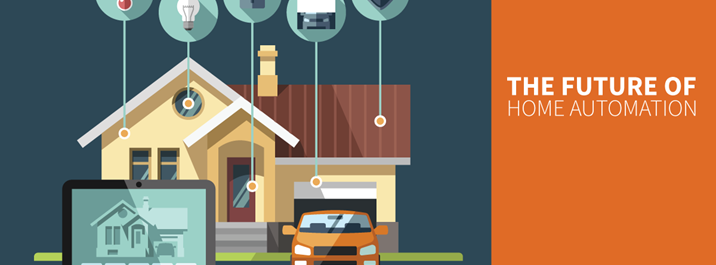The Future of Home Automation

When it comes to predicting the technology of the future, there's a lot we could speculate. The truth is, we can't know exactly what the future holds, especially in the tech world. If forecasts were always accurate, then we'd all be cruising around in flying cars and wearing jetpacks. However, current trends and consumer demand patterns can give us reasonably accurate hints of where the industry is heading. We've seen home automation go through a massive shift in recent years, from something just a few privileged folks used to enjoy, to becoming integrated into to a significant and growing number of households. Although this type of technology is still considered a luxury, it's becoming more common for homes to have automated features and devices. What does the future look like in the home automation field? We can't say for sure, but in this article, we'll point out some prevailing trends that indicate the direction it's going.
The Internet of Things
According to Wikipedia, The Internet of Things is a network of physical objects embedded with electronics, software, sensors, and network connectivity, which enables these objects to collect and exchange data.* Gartner, a leading information technology research and advisory company, predicts that around 26 billion devices will be accessing the Internet of Things by 2020 while only 900 million were connected in 2009.** Given this movement, you can expect to see a continuing increase in household accessories becoming linked, automated, and able to share data, creating exponential possibilities as more of our devices become wirelessly united.
A Glimpse Into The Future
Every year all the big players in the field of electronic gadgets gather in Las Vegas to flaunt their ideas, innovations, and greatest prototypes. The Consumer Electronics Show (CES) is a window into the possible future of technology. In recent years, home automation devices have been gaining some serious presence at the conference. Here are a few highlights from this year's symposium indicating the type of innovations we can anticipate:
Samsung HDR 4K Smart TVs
Imagine you're sitting at home about to watch a movie with your family. You're all curled up on the couch with warm blankets and a giant bowl of fresh, buttery popcorn. The only problem is the room’s lighting, and the last thing you want do right now is get up to make the adjustments. Fortunately, you have one of Samsung's new HDR 4K TVs, recently introduced at CES 2016. Besides the stunning 4K picture quality, these mean machines are capable of being home automation hubs, meaning you can control and monitor any smart device from your TV screen. With a stroke of your remote control, you select the pre-programed custom movie setting and initiate the mood sequence. Your lights dim to just the right level, the blinds close automatically, and your house doors lock simultaneously; now you're truly ready to enjoy the feature film. This example is just one of the virtually endless capabilities that this dynamic technology provides at the touch of a button. Learn 7 Benefits of a home theater installation system!
Control4’s Connected Car App
Our cars might not be flying, yet, but even automobiles are becoming integrated into the Internet of Things. Have you ever been driving to work and thought you might have forgotten to lock the doors at home? It's too late to turn around, but then again that feeling of a vulnerable house could haunt you for the rest of the day. This year at CES 2016, Control4 debuted a solution to these types of problems with their smart home app for the car. The app syncs with a vehicle's dash display unit, giving Control4 users access to their smart home devices such as garage doors, lights, door locks and thermostats, all from the cockpit of your vehicle.
Open Source Automation
With everything changing so fast, the last thing you want to do is install some equipment in your home just to have it become obsolete in the next year. Luckily, there's good news. Most, if not all of the technology will continue to run on open source software, meaning once you've installed automation hubs in your home, you'll be able to add components to the system down the road. As technology grows and changes, new devices will still be fully compatible with previously installed ones. So rather than having to replace outdated items, you can incorporate new ones into your existing system, and everything will continue to work seamlessly.
It's hard to say exactly what the future will bring, but there's certainly enough evidence available to make educated guesses. We’re presently moving rapidly in the direction of increased home automation, with more and more devices becoming 'smart' all the time. Whether you're in Bellevue, Kirkland, Seattle or any surrounding cities of Washington, home automation is becoming a thriving convenience in these areas. If you've been interested in this type of technology for your residence or are currently in the process of creating a smart home, Wipliance is the leader in the Seattle area of home automation. Our brilliant staff would love to consult you on your next or ongoing project. We'll get you setup as automated as you'd prefer, and even make it easy to grow your automation capabilities as technology advances in the years to come. Contact us today to discuss ideas or for help with a design concept for your plan.
